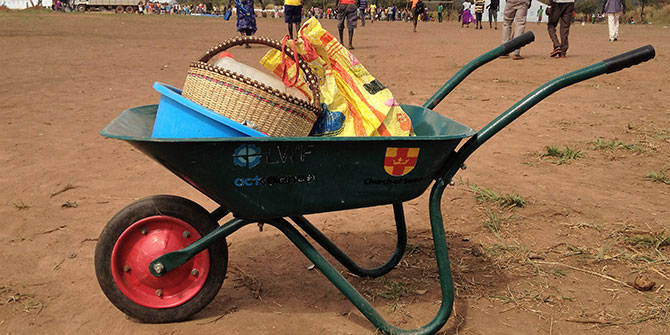LSE’s Emily LeRoux-Rutledge shares insights from a recently published article on children affected by HIV/AIDS in Eastern Zimbabwe.
“There is a boy whose parents died of AIDS … He doesn’t have food. He is always hungry. He doesn’t have anyone to pay school fees for him and he doesn’t have clothes. He wears rags.” – Schoolchild, Eastern Zimbabwe
The social effects of HIV/AIDS are said to hit girls in sub-Saharan Africa harder than boys. When family members get sick, girls are often the first to leave school to take on nursing and additional household duties – at least, that’s what the research suggests. Except, it is not necessarily what kids themselves think.

In our recently published article: It’s harder for boys? Children’s representations of their HIV/AIDS-affected peers in Zimbabwe, my co-authors and I found that, in a rural school in Eastern Zimbabwe, children thought just the opposite.
We asked 128 children to draw a picture and write a story about an HIV/AIDS-affected child, randomly allocating them to write about either a girl or a boy. The results showed that boys were more often depicted as materially deprived, lacking adult and teacher support, and heavily burdened with household duties.
For example, in 53% of stories about boys, household duties were raised as an issue, compared with only 17% of stories about girls. One child’s story, about a boy, read:
He does household chores when he comes back from school. He fetches water and washes dishes. This boy bathes males who are ill who stay at his home. Before going to school he does household chores and bathes the sick people.

Moreover, only 21% of stories about boys showed them receiving any kind of teacher or school support, compared with 42% of stories about girls. (This is broken down in detail in Figure 1.) Another child’s story, about a girl, read:
Her parents died of AIDS last year. The school pays for her school fees, buys her clothes, uniforms, shoes, books, pens, pencils and other things.
What to make of this?
Certainly, the perception among children in this context is that HIV/AIDS-affected boys suffer more than HIV/AIDS-affected girls. If there is truth to this, then it might point to an important and overlooked aspect of the effects of HIV/AIDS on children – namely that it is more difficult for HIV/AIDS-affected boys to leverage support from adults and teachers, and that a heavy burden of household work falls on their shoulders. Organisations working to support HIV/AIDS-affected children may benefit from understanding these unique challenges facing boys.
If, on the other hand, the perceptions of the children in this study are not based on real differences – that is, if the challenges facing HIV/AIDS-affected boys and girls are broadly similar – then the study points to a different set of implications. In a context where men have more power than women, it may be that male suffering is more notable than female suffering. When it comes to household duties, boys performing duties traditionally reserved for girls may simply attract more notice, leading to greater sympathy for HIV/AIDS-affected boys, and less peer support for girls. This too would be important information for organisations working to support HIV/AIDS-affected children. Girls may need their suffering to be acknowledged and recognized by their peers, in order to leverage the sympathy and social support available to their male counterparts. Without further research, it is difficult to say.
What do you think?
You can read the open access paper entitled: It’s harder for boys? Children’s representations of their HIV/AIDS-affected peers in Zimbabwe on which this article is based.
Emily LeRoux-Rutledge is a researcher in the Department of Social Psychology at the LSE. She is currently conducting research on the role that media narratives play in women’s identity construction in South Sudan. She is also a research and evaluation consultant with more than a decade of professional research experience managing media research, social research, and monitoring and evaluation research in 22 developing countries across Africa, Asia and the Middle East. She can be contacted via her academic website or professional website, and she is on Twitter as @LeRouxRutledge.
The views expressed in this post are those of the author and in no way reflect those of the Africa at LSE blog or the London School of Economics and Political Science.






Interesting research! As you say, more study is needed, however I think your work definitely contributes to growing recognitions of the interdependence of gendered experiences in many African contexts. Current programmes which focus solely on girls miss the bigger picture and foster a compartmentalised perception of complex and relational social dynamics.
I’m interested to know whether you’ve analysed the data in terms of any differences, patterns or particularities, when correlating the gender of the narrator to the gender of the assigned “fictional” character.